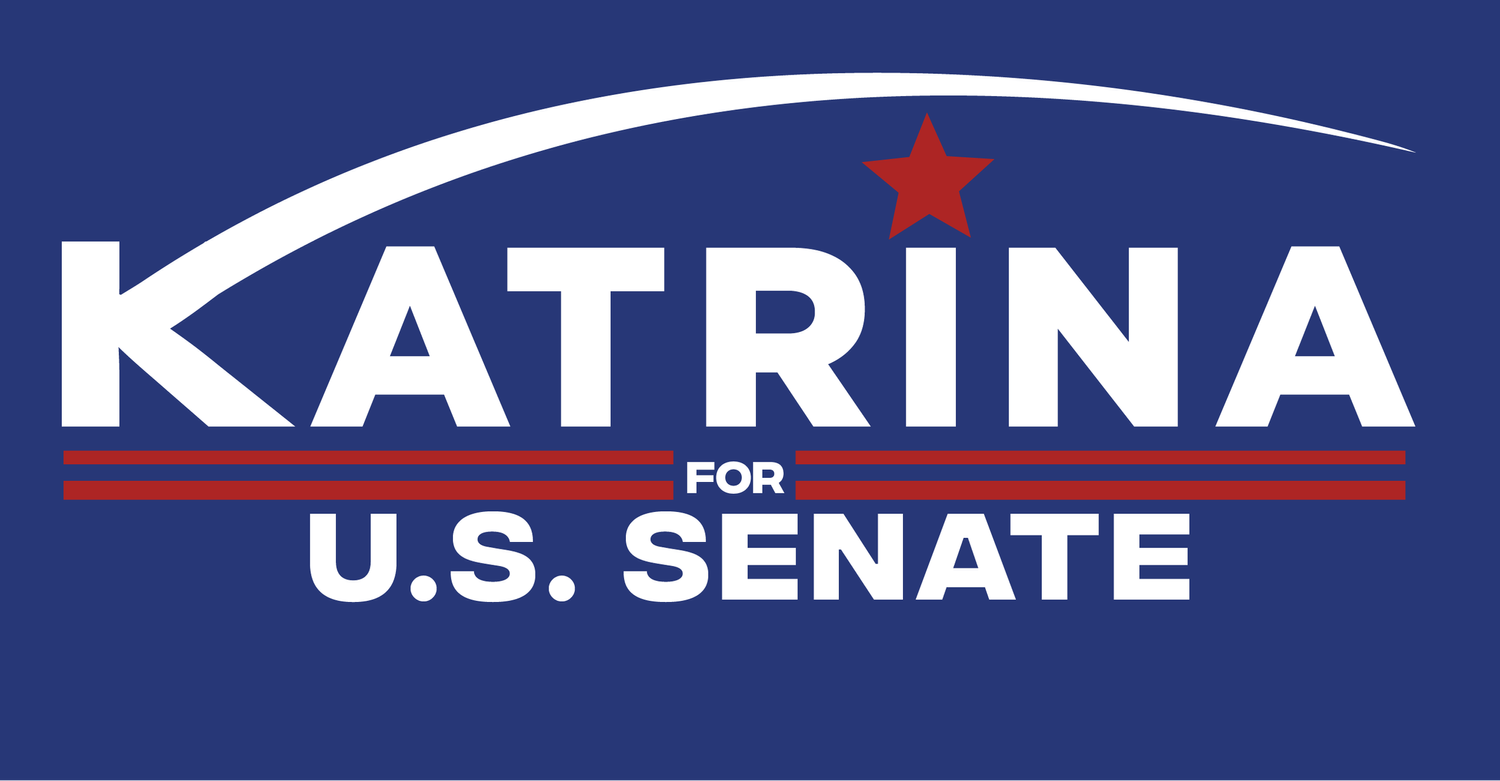Running into powerful headwinds, U.S. Senate challenger Katrina Christiansen feels right at home
Published by The Forum | May 8, 2024
FARGO — No North Dakota Democratic-NPL candidate has exceeded the 30% threshold in a statewide election since 2018. That’s the year former Sen. Heidi Heitkamp received 45% of the vote in her reelection bid, when Kevin Cramer toppled her in one of the nation’s most closesly-watched and hotly contested races.
Now, Cramer is the one playing defense. The 40-year insider and officeholder from the state’s dominant Republican Party is facing a political newcomer who is not only undaunted by his commanding lead in fundraising and the GOP’s political supremacy in North Dakota, but actually feeds off the challenge.
When she decided to make her first run for office in 2022 against two-term U.S. Sen. John Hoeven, Katrina Christiansen had advisors try to warn her, saying it would be like climbing a mountain, that there would be no looking back…
This was not the kind of cautionary counsel they thought it would be. If anything, it made Christiansen feel more comfortable.
“I've been climbing a mountain my whole life,” Christiansen said.
Christiansen ultimately lost her bid to unseat Hoeven, garnering just 25% in a three-way race that included Rick Becker, who is running in the Republican primary for state’s open U.S. House seat this cycle.
“After I lost in 2022, I felt good,” Christiansen said. “I felt good because I participated in our democracy and I was honest and authentic about what I cared about. I didn't sell my soul. And all I could think was, I can't imagine how good it feels to win. And I am very excited to feel that on Nov. 5.”
This time around, Christiansen said, feels “tremendously different,” rattling off a list of assets she has in 2024 that she lacked in 2022.
“Getting in early, having a staff, having a campaign manager, having a political director, having a finance director who has experience raising money in red states,” she said.
But mostly, it’s Christiansen, the candidate, who has transformed.
“I am much more focused,” she said. “Having the staff — people to figure out how to build that infrastructure and do the problem-solving that campaigns need is so helpful as a candidate, so I can just focus on what it is that I need to do, which is raising money, for starters, to make the race viable, so that we can get our message out there. But then getting out to campaign. I really am an extrovert. I love meeting new people and hearing them talk about things.”
And, she’s getting better at telling her story. In 2022, Christiansen focused on her engineering background, the three patents she held and her systemic, problem-solver approach to issues. This time around, she said, she knows she needs to dispel some stereotypes voters have about Democrats and let them get to know her a little better.
“I'm not Nancy Pelosi, I'm not Chuck Schumer,” she said. “I'm this kid from Pender, Nebraska (population 1,048). I grew up poor, in harsh conditions. I had to work my way through college and keep up scholarships to pay for school. I've worked my whole life to get to where I am. I just want to make sure that people have the same opportunity that I had, and that they're OK, that they have the things they need in order to thrive in North Dakota.“
The first ad that Christiansen’s campaign released this cycle, titled “Wolves,” garnered national attention. It depicts a typical, small family farmyard at night, wolves howling in the background, while inside the modest house a farmer sits at a table paying bills while his young daughter looks on. Christiansen narrates.
“When I was a little girl, a wolf hunted our family farm,” she says. “It wasn’t content to pick off a chicken, or the family dog. It wanted the whole farm.”
“My parents always thought they'd catch a break. But they never did. The wolves came for mom and pop stores, they came for cheap prescription medicine, they came for affordable homes, they came for college loans. Forget inflation. Wages never kept up with corporate greed,” the ad continues.
The ad ends with the little girl from the start of the ad standing face-to-face with a wolf.
“My kids have no concept of the poverty I grew up with — the insecurity and the shame — and as long as they're under my roof, they won’t. Our senator should feel that way about all of us — should be protective of each of our children, our rights, our health, our land and water, our safety and national security. Our senator shouldn't be afraid to face the wolves,” it finishes.
“That ad was really hard for me to make,” Christiansen told The Forum. “It was super easy to say I'm an engineer, I have three patents…but it's very challenging for me to talk about how hard it is to be a poor kid pretty much your entire life.”
After they lost the farm, Christiansen’s father was in and out of laborer jobs for several years before finally landing at the Great Dane transportation company, working for 25 years putting wheels on the back of semi-truck trailers there before retiring in 2016. Christiansen said she was well aware of the family’s dire financial straits growing up, so much so that she once hid a life-threatening illness from her parents because she was worried they couldn’t afford the medical treatment.
“There were backstops that kept everybody OK — like WIC and food stamps, free and reduced lunch. I went to Head Start, those sorts of things,” she said. “But I've looked at social mobility data and maps and if you look at where I grew up, Thurston County, and my dad's income — he maybe made $25,000 a year supporting six people — it shows that I had an 11% chance of being where I am now based on those factors. That’s not even a coin flip, those are just really bad odds.”
Christiansen was her high school class valedictorian and went on to earn a doctorate in agricultural engineering from Iowa State University.
She said her internal polling shows that people respond to her story. Her team conducted a recent poll heavily weighted with Republican voters.
“I would say the pollsters were shocked when we went over the results. Only 33% of the voters said they would vote for Kevin. That's it. I'm going to be honest with you, my name recognition wasn't great. But after we did an informed ballot, we were up two points,” she said. In an informed ballot, pollsters provide respondents background information on each candidate.
Christiansen said she’s willing to engage with voters wherever they might be gathered, even those in parts of the state where Democrats are especially sparse.
“I went to a bison sale in December after a blizzard and told the people in that room: my opponent identifies problems and he assigns blame and that's where he stops. I'm here to solve problems. And then I just listened to them, and they've got some really hard problems. The fact that they were willing to have dialogue with me says a lot,” she said.
An independent voter recently asked Christiansen to weigh in on the Summit Carbon Solutions pipeline.
“Even though the pipeline isn’t a federal issue he wanted to know where I stood on it. So I told him: it's a land rights issue, the owners have the right to make this decision. And he was really surprised that I thought that way,” she said. “After we discussed other issues he said ‘well, you don't sound like a Democrat.’ And I said, ‘well, we're not a monolith.”
Christiansen thinks Cramer hitching his star to Donald Trump’s popularity in North Dakota isn’t enough to carry him, and that it might even be a liability.
“I don't think Trump’s going to be coming to North Dakota to campaign (for Cramer) four times this year, like he did in 2018,” she said. “And Cramer’s part of the machine. He was supportive of Trump’s tariffs that destroyed the soybean market here. Losing that incredible market at the hands of Trump with Cramer supporting it — that’s just irresponsible of your constituents,” she said.
China was the buyer of 70% of North Dakota’s soybeans before the crop was a prime casualty of a U.S.-China trade war in 2018. After the Trump administration imposed tariffs on Chinese imports, China quickly responded with retaliatory tariffs, essentially halting soy exports to the country overnight.
The Department of Agriculture issued a report estimating that the trade war cost the U.S. agricultural market over $27 billion, with soybeans accounting for 71% of those losses. Christiansen said that North Dakota growers alone lost between $3-6 billion.
“Kevin is a very good politician in the sense that he knows how to tie himself to a path to victory, but he hasn't built a reputation — like Conrad and Dorgan and Heitkamp — of accomplishments,” Christiansen said, referencing former Sens. Kent Conrad, Byron Dorgan and Heidi Heitkamp.
Christiansen said Cramer’s lack of support for a recent deal to provide emergency funding for the southern border crisis has come up repeatedly from voters she talks to on the campaign trail.
“I think there's just a real sense of people not feeling heard. We have an opioid issue in North Dakota, and people want those fentanyl detectors in, so wanting that bipartisan border bill to have passed is a huge issue I hear about and it's not party driven — it's across the board a concern,” she said.
While she acknowledged she faces an uphill battle, Christiansen is armed with data that shows she can compete with Cramer, even with Trump on the ballot.
“In 1986 Kent Conrad overcame a 30-point deficit to beat an incumbent during a popular Reagan presidency. This is not unprecedented,” she said.
Christiansen said there are three things she thinks are necessary to pull off an upset this fall.
“Sen. Heitkamp won in 2012 and she raised more than $3.5 million. In 2018, Billy Sutton in South Dakota raised over $3.5 million, and got almost 48% of the vote against Kristi Noem. So the reality is Democrats can be competitive in this part of the country, but it takes money and it takes having good candidates — like myself, like Trygve Hammer,” she said. Hammer is the Democratic-NPL candidate for U.S. House in North Dakota.
“And the third thing,” she said, “is disarming 75,000 North Dakota voters by showing up and showing them ‘oh my God, this woman is just like us.’”
— by Tasha Carvell


